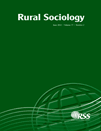
RURAL SOCIOLOGY
Scope & Guideline
Bridging Sociology and Political Science in Rural Contexts
Introduction
Aims and Scopes
- Rural Social Structures and Relationships:
Explores the dynamics of social relationships in rural communities, including family structures, gender roles, and ethnic diversity, emphasizing how these elements shape rural livelihoods and community resilience. - Rural Development and Policy:
Examines the impacts of policies and practices on rural development, focusing on sustainable agricultural practices, rural economies, and the role of local governance in fostering community well-being. - Environmental and Agricultural Sociology:
Investigates the interplay between agriculture, environmental change, and community health, highlighting sustainable practices, climate change impacts, and the socio-political factors influencing rural environments. - Cultural and Identity Studies in Rural Contexts:
Analyzes how cultural narratives and identity formation impact rural communities, including issues of race, ethnicity, and social justice, reflecting the diverse experiences of rural populations. - Technological Impact on Rural Life:
Focuses on the role of technology in transforming rural economies and social structures, including digital inclusion, access to information, and the implications of technological advancements for rural livelihoods.
Trending and Emerging
- Indigenous Issues and Rights:
Increasing attention is being given to the rights and perspectives of Indigenous communities in rural contexts, reflecting a growing recognition of their unique challenges and contributions to rural sociology. - Technology and Digital Inclusion:
The impact of digital technologies on rural communities is becoming a significant area of inquiry, particularly how these tools can enhance social cohesion and economic opportunities. - Gender Dynamics in Rural Settings:
Research focusing on gender roles and the experiences of women in agriculture and rural economies is on the rise, highlighting issues of empowerment, leadership, and social equity. - Mental Health and Well-Being in Rural Areas:
Emerging studies are increasingly focusing on mental health challenges in rural populations, addressing the unique socio-economic factors that contribute to well-being. - Climate Change and Environmental Justice:
There is a growing emphasis on the intersection of climate change, environmental policies, and justice issues in rural settings, reflecting urgent global concerns and local impacts.
Declining or Waning
- Traditional Agricultural Practices:
There has been a noticeable decrease in studies centered on traditional farming methods, as the discourse shifts towards modern agricultural technologies and sustainable practices. - Rural-Urban Migration Studies:
Research focusing specifically on rural-urban migration patterns appears to be waning, possibly as attention turns towards the implications of urbanization rather than the migration itself. - Historical Perspectives on Rural Life:
While historical analyses have been a staple in rural sociology, recent publications indicate a decline in this area as contemporary issues take precedence over historical narratives. - Community Resilience in Crisis Contexts:
Studies on community resilience during crises, such as natural disasters or economic downturns, seem to be less frequent, indicating a potential shift towards more proactive approaches to rural development. - Local Food Movement:
While still relevant, there is a diminishing focus on the local food movement as researchers explore broader systemic issues impacting rural food systems and sustainability.
Similar Journals
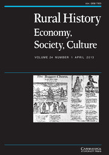
Rural History-Economy Society Culture
Exploring the Tapestry of Rural Life Through History, Economy, and Culture.Rural History: Economy Society Culture is a vital academic journal dedicated to exploring the multifaceted aspects of rural history from economic, societal, and cultural perspectives. Published by Cambridge University Press, this journal contributes substantially to the field by presenting innovative research that spans a range of disciplines, including history, geography, and urban studies. With a convergence of scholarship from 1990 through 2024, this journal holds significant rankings in the top quartiles of its categories, particularly excelling in History where it ranks in the Q2 quartile. It also demonstrates respectable positions in other arts and humanities domains, reflecting its considerable impact, especially in history-related studies, where it sits in the 76th percentile. While not open access, it provides valuable insights for researchers, professionals, and students passionate about understanding the dynamics of rural societies and their historical underpinnings. For scholars aiming to contribute to this rich dialogue, Rural History serves as an essential platform for disseminating significant findings and advancing knowledge in the field.

Journal of Rural Studies
Empowering Rural Discourse Through ScholarshipWelcome to the Journal of Rural Studies, a premier peer-reviewed publication dedicated to advancing the field of rural research. Published by PERGAMON-ELSEVIER SCIENCE LTD, this esteemed journal has been a cornerstone of scholarly discourse since its inception in 1985 and continues to evolve through 2024. With an impressive impact factor and categorization in the Q1 tier across various fields, including Development, Forestry, Geography, Planning and Development, and Sociology and Political Science, the journal is among the elite voices in rural studies. Researchers, professionals, and students alike will find invaluable insights within its pages, supported by rigorous empirical research and theoretical explorations that address the complexities of rural life and its myriad challenges. While it currently does not offer open access, the subscription model ensures a broad dissemination of knowledge, fostering collaboration and innovation within the academic community. With a robust Scopus ranking that places it in the top percentiles across multiple social sciences, the Journal of Rural Studies remains an essential resource for those dedicated to understanding and improving rural environments worldwide.
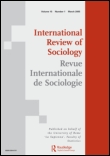
International Review of Sociology-Revue Internationale de Sociologie
Shaping the future of sociology and political analysis.International Review of Sociology-Revue Internationale de Sociologie is a distinguished academic journal published by Routledge Journals, Taylor & Francis Ltd, focusing on the critical exploration of sociological and political science theories and practices. Since its inception, the journal has continually evolved, with publications dating back to 1987, and it remains a prominent reference point within its field, currently ranking in the Q2 category for Sociology and Political Science in 2023. With an impressive Scopus rank of #430 out of 1466, it places the journal in the 70th percentile among social sciences journals, reflecting its influence and significance in advancing sociological discourse. The International Review of Sociology serves as a platform for researchers, practitioners, and students eager to engage with contemporary issues, fostering a rich exchange of ideas that spans across cultural, political, and social dimensions. While it does not currently offer open access, its rigorous peer-review process ensures the publication of high-quality research essential for both academic and professional audiences.

Region
Fostering dialogue on the socio-economic landscapes of our world.Region is a distinguished journal published by SLAVICA PUBLISHERS, focusing on a multidisciplinary approach to the study of economic, historical, sociological, and political contexts across various regions. With an ISSN of 2166-4307 and an E-ISSN of 2165-0659, this journal serves as a vital platform for scholars seeking to contribute to the discourse on regional studies, emphasizing how geographical, cultural, and historical factors shape socio-economic systems and political landscapes. Although currently categorized in Q4 for Economics and Econometrics, Q2 for History, and Q3 for Sociology and Political Science, Region spans its publication trajectory from 2012 to 2023, continually aiming to uplift the standards of research in these fields. With Scopus rankings and percentiles showcasing a notable impact in History and a commitment to scholarly excellence, Region is dedicated to fostering an inclusive academic dialogue and provides an essential resource for researchers, professionals, and students committed to understanding the complexities of regional dynamics.

Rural Extension and Innovation Systems Journal
Inspiring Change through Research and Collaboration.Rural Extension and Innovation Systems Journal, published by the Australasia Pacific Extension Network (APEN), is a premier platform dedicated to advancing knowledge and practice in the field of rural extension and innovation systems. With the ISSN 2204-8758 and E-ISSN 2204-8766, this journal aims to bridge the gap between theory and practice by disseminating high-quality research that addresses the unique challenges faced by rural communities. The journal's open access policy facilitates the broadest possible dissemination of scholarly work, ensuring that insights into rural development, innovative agricultural practices, and sustainable resource management reach a global audience. By fostering collaboration among researchers, practitioners, and policymakers, the Rural Extension and Innovation Systems Journal plays a pivotal role in promoting effective extension services and enhancing the overall well-being of rural populations. With an increasing focus on the role of innovation in rural development, this journal is essential for anyone looking to explore, contribute to, or stay informed about the latest trends and developments in this vital area.
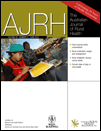
Australian Journal of Rural Health
Exploring innovative solutions for rural health challenges.Australian Journal of Rural Health, published by WILEY, is a leading peer-reviewed journal dedicated to advancing the understanding of health issues affecting rural populations in Australia and beyond. Established in 1992, this journal has successfully converged its focus into the contemporary landscape of rural health, promoting innovative research and practical solutions. With an impressive positioning in various categories—ranked Q2 in Family Practice and Q3 in Public Health, Environmental and Occupational Health for 2023—the journal is pivotal for researchers, healthcare professionals, and students aiming to explore pivotal studies and developments within these fields. The journal is indexed in Scopus, showcasing its credibility and impact within the academic community; it holds a rank of 24/56 in Family Practice and 386/665 in Public Health, emphasizing its relevance and contribution to the discourse on rural health challenges. While it does not operate under an open access model, the Australian Journal of Rural Health remains a vital resource for exploring the intricacies of rural healthcare provision and its implications for policy and practice.
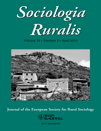
SOCIOLOGIA RURALIS
Transforming Understandings of Rural InteractionsSOCIOLOGIA RURALIS, published by Wiley, stands as a leading academic journal in the field of sociology and political science, boasting an impressive Q1 classification in the 2023 category quartiles. With an ISSN of 0038-0199 and E-ISSN 1467-9523, this journal has been a cornerstone of rural sociological research since its inception in 1960. SOCIOLOGIA RURALIS aims to explore the complexities of rural communities, the dynamics of rural-urban interactions, and the sociopolitical structures that influence rural life. Its esteemed standing is reflected in its Scopus rank of 77 out of 1466, placing it in the 94th percentile of social sciences journals. Although currently not an open-access publication, the journal provides critical insights that significantly advance the understanding of rural issues, making it an essential resource for researchers, practitioners, and students dedicated to the field.
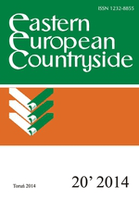
Eastern European Countryside
Documenting the Evolution of Eastern European Rural LandscapesEastern European Countryside is an insightful academic journal dedicated to the exploration and analysis of rural development, social dynamics, and environmental issues within Eastern Europe. Published by SCIENDO, the journal has established itself as a valuable resource for researchers, professionals, and students interested in the intersection of geography, sociology, and political science. With an ISSN of 1232-8855 and an E-ISSN of 2300-8717, the journal provides a platform for high-quality papers addressing key issues affecting rural areas in the region, reflecting on the changes observed from 2009 to 2022. Despite currently being positioned in the Q4 quartile in both Geography, Planning and Development and Sociology and Political Science categories, the journal’s commitment to enhancing knowledge in these fields is unwavering. Researchers are encouraged to explore the articles available through this esteemed publication, which continues to play an essential role in disseminating findings that contribute to the understanding of socio-political and environmental contexts within Eastern European rural spaces.

Scientific Papers-Series Management Economic Engineering in Agriculture and Rural Development
Catalyzing Change in Rural Development through Economic EngineeringScientific Papers-Series Management Economic Engineering in Agriculture and Rural Development is a premier open access journal dedicated to advancing the field of agricultural and rural development management. Published by the University of Agronomic Sciences and Veterinary Medicine Bucharest, this journal has been a valuable resource for researchers, practitioners, and students since its inception in 2009. With a focus on the integration of economic engineering principles into agricultural practices, the journal aims to provide innovative solutions and insights that address contemporary challenges in rural development. While the journal's H-index and specific Scopus rankings are not listed, its open access format ensures that cutting-edge research is readily available to a global audience, facilitating engagement and collaboration across disciplines. Located in the heart of Romania, the journal serves as a critical platform for disseminating impactful research and fostering dialogue in the ever-evolving landscape of agriculture and rural development.

Fennia-International Journal of Geography
Exploring the frontiers of geography and beyond.Fennia-International Journal of Geography is a prominent peer-reviewed journal published by the Geographical Society of Finland, dedicated to advancing the field of geography through innovative research and critical discourse. With an ISSN of 0015-0010 and an E-ISSN of 1798-5617, this journal has established itself as a vital resource for academics and professionals alike since its inception in 1976. Notably transitioning to an Open Access model in 2010, Fennia provides wide accessibility to its content, fostering a global exchange of ideas and findings in various sub-disciplines of geography. The journal is currently categorized in the Q2 quartiles for Ecology, Forestry, and Geography, Planning and Development, indicating its influential standing among scholarly publications. Its Scopus rankings reflect its relevance and significance, including a 63rd percentile rank in Agricultural and Biological Sciences, and a 59th percentile in Social Sciences. Fennia serves as a crucial platform for the dissemination of research findings, policy analysis, and theoretical explorations, thereby greatly contributing to the understanding and development of geographical sciences globally.